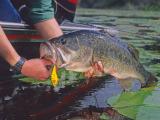Apr 23, 2002 (CIDRAP News) – The Food and Drug Administration (FDA) has warned against eating pufferfish caught near Titusville, Fla., in the wake of 10 cases of neurologic illness that have been linked with the fish since January.
The Centers for Disease Control and Prevention (CDC) reported last week that saxitoxin, a paralytic shellfish toxin, was found in pufferfish from the Titusville area in early April. In the Apr 19 issue of Morbidity and Mortality Weekly Report, the CDC described five cases in which people got sick after eating pufferfish.
The FDA warning, issued last week, said the toxin can cause tingling and burning of the mouth and tongue, numbness, drowsiness, incoherent speech, and, in severe cases, respiratory paralysis and even death. Symptoms develop within 30 minutes to 2 hours after eating the fish. The toxin is not destroyed by cooking or freezing and does not change the smell or taste of food.
"It is imperative that consumers not eat puffer fish from the Titusville, Fla., region," said FDA Deputy Commissioner Lester M. Crawford. "The FDA continues to work closely with the CDC and the state authorities to protect the public health, but in the meantime anyone who may have eaten [pufferfish] should be alert to these possible neurological symptoms and seek medical help if it is needed."
People who have suggestive symptoms and suspect they have eaten pufferfish from the Titusville area should contact their physician or local poison control center, the FDA said. People who have questions may call the FDA's Food Safety and Applied Nutrition Center at 1-800-SAFEFOOD.
The five patients in the cases described by the CDC all recovered from their illness. All had numbness and tingling, and two had gastrointestinal symptoms. One patient, a 65-year-old woman, was placed on a ventilator after she experienced ascending paralysis; she recovered after about 3 days.
The CDC said 10 cases of presumed pufferfish poisoning have been identified since Jan 1. The cases included five in Florida, three in New Jersey, and two in Virginia, but all were linked with pufferfish from the Titusville area.
Most pufferfish caught in US waters are not known to be toxic, and the recent cases represent the first report to the CDC of neurotoxic pufferfish in the Atlantic Ocean, the agency said.
Analysis of fish samples recovered in one of the New Jersey cases detected saxitoxin and two saxitoxin analogs, the CDC reported. Saxitoxin is produced by certain dinoflagellates and some freshwater cyanobacteria. When these organisms multiply, shellfish (mainly clams, mussels, and scallops) may eat them and become contaminated. "Pufferfish eat mollusks and might accumulate or even magnify the toxin," the CDC said. The agency said "nonfilter" feeders such as fish, lobsters, crabs, and shrimp are generally safe to eat, even if caught in contaminated waters.
See also:
CDC. Neurologic illness associated with eating Florida pufferfish, 2002. MMWR 2002(Apr 19);51(15):321-3
Full text




















